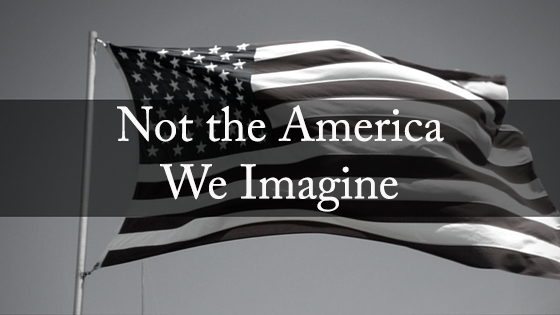Not the America We Imagine

The fatal shooting of two more African American males at the hands of police, along with the murder of five police officers in Dallas this week are tragedies beyond comprehension. But they have to be a product of who we are, otherwise they would not have happened. Whatever the motives of the police or the Dallas assassin, these acts of violence bring more grief upon a nation and shine a light on who we really are; and what we are not.
There is a picture that America paints of itself, which is about freedom, liberty and opportunity. These may be great values underpinning brand America, but they do not appear to translate to the lived reality of as many Americans as we would like to think. We see it in the mass shootings that occur with alarming regularity. We see it in the hundreds of murders that only briefly get a mention in the morning’s newspaper. We see it in the pain felt by the millions of our black citizens, who view the police, and their fellow Americans with mistrust. And we see it in the fear police have of serving the communities they swore to protect. There would not be so much fear and mistrust if we lived the values we say we have.
People are asking how did we get to the point where violence is so prevalent? The statistics on how disproportionate rates of arrest are for black people are well known, as are the high rates of incarceration, as are school disparities, speak for themselves. The two Americas also translate to the haves and have nots, the insiders and outsiders. We are set up for people to succeed, but if there is not equal opportunity to succeed, then a vicious cycle of frustration, disappointment and disaffection will continue.
The treatment of African Americans in American society is dehumanizing and the bias in this case is not government led, but is insidious, unconscious, baked into our upbringing, our media, our institutions.
Motorists do not consciously drive past an African American pedestrian at a crosswalk rather than wait, and NBA referees don’t consciously call more fouls on black players than whites, but the University of Arizona proved the former, and Brigham Young University documented the latter. Put bias reflexes in a high-adrenaline confrontation and the result, as we’ve witnessed, can be devastating.
We are all guilty of this, it’s just we don’t all have a gun.
There has been a lot of talk from political leaders about this not being a true representation of America; that we are somehow better than what we see. Unfortunately, the camera does not lie. But it does only tell a part of the truth. As easy as it is to lay blame, it is not law enforcement that is at fault. They merely represent the rest of us. And like the rest of us, they come in all kinds of shapes and sizes. And like the rest of us they represent more than one America. The men and women who police our streets keep us safe, their noble field is to help others, not to hurt them.
Change never comes from crisis, but from how we react to crisis.
They deserve our respect and admiration. Change never comes from crisis, but from how we react to crisis. Early this year, in response to a horrific police shooting in their own city, the San Francisco Police Department revamped its use-of-force training, instilling in its recruits the value of critical thinking and the sanctity of life. It remains to be seen whether that will work, but at least they are prepared to try.
I have come across many testimonies in the Visual History Archive where Jews thought because they were living in the same country that they were afforded the same dignity, same opportunity, the same safety. The truth is, it was never equal for them, even when they had the trappings of integration.
If I have learned one thing as an oral historian, it is to listen closely to the voice of the outsider, the victim, the oppressed; because like the canary in the mineshaft they know more than anyone what is really in the air. If we are hearing from the black population that America is not a society of equality today, we can be sure it is not. They know, because they live its consequences. We can either listen and make that better, or ignore it and allow America to become further divided, because it certainly will.
We are going to have to dig deep, because I suspect the two Americas are deep inside us. We will not only have to challenge our policies, our training, our politics; not only rethink the conscious decisions we make, the friends we keep, the things we say and do, but also delve into our unconscious selves, because when the trigger is pulled on our words, our actions, our guns, it is an expression of who we really are, not who we like to think we are.